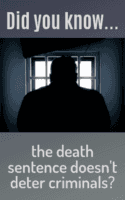There have been many calls for the death sentence in South Africa recently. When we hear of brutal rapes and murders, many feel such anger and despair that they want the rapists and murderers to be killed.
However, there are many reasons why this is not a good idea, no matter how justified it may feel in the heat of the moment.
One reason is that research proves that fear of the death sentence doesn’t prevent people from committing a crime. Countries that have the death sentence (or have had it in the past) do not necessarily have lower murder statistics. There is no evidence that proves that if there is the death sentence, would-be criminals will be frightened and then not rape or kill anyone.
In fact, research shows that simply being caught is a greater deterrent than the extent of the punishment. So, if someone believes that there is a high chance that they will be caught doing something wrong, they are more likely to avoid doing it, even if the sentence is not very severe.
That means that people are less likely to commit a crime if they think they may be discovered, arrested and set to trial. So, the best way of reducing crime is to focus on effective and honest policing, rather than calling for the re-institution of the death penalty.
Also, having the death sentence in place for rape could make it worse for those who are raped. If it becomes law that rapists have to be sentenced to death, judges may be reluctant to find people guilty of rape or may require excessive proof before finding people guilty. In addition, rapists may be more likely to try to kill their victims, and so avoid being identified.
The other problem with the death penalty is that although we are all meant to be equal before the law, there are some who can afford good lawyers who help to ensure the trial is fair, and there are some who can’t. This can mean that some people are wrongly convicted, simply because they did not have good legal counsel.
In America, over 100 people have been found to have been convicted and sentenced to death wrongfully – that is, they are not guilty of the crime they were accused of. These are just the ones we know about, whose cases were investigated, and who were then freed. It is very likely that innocent people have been killed by the state.
In South Africa, we already have an under-resourced police force and legal system. We cannot guarantee that no mistakes will be made – and these ‘mistakes’ could mean that innocent people are killed if they are found guilty in error.
We are famous for our progressive constitution, which enshrines the right to life. The death penalty, said a Constitutional Court judgment in 1996, is a cruel, inhuman and degrading punishment’.
The challenge is to rise above our anger and pain and respond with care, as otherwise we could be caught in an increasing spiral of violence.

